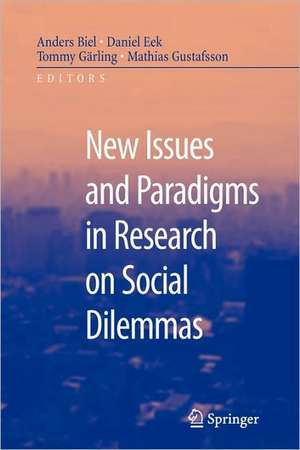New Issues and Paradigms in Research on Social Dilemmas
Editat de Anders Biel, Daniel Eek, Tommy Garling, Mathias Gustafsonen Limba Engleză Paperback – 4 noi 2010
The main aim of this work was to investigate under what circumstances people make decisions that are inline with the collective interest as well as investigating what can increase the likelihood of cooperation. There will be three man sections mirroring the different levels of analysis: individual, group, and societal.
| Toate formatele și edițiile | Preț | Express |
|---|---|---|
| Paperback (1) | 388.34 lei 6-8 săpt. | |
| Springer Us – 4 noi 2010 | 388.34 lei 6-8 săpt. | |
| Hardback (1) | 395.63 lei 6-8 săpt. | |
| Springer Us – 17 oct 2007 | 395.63 lei 6-8 săpt. |
Preț: 388.34 lei
Nou
Puncte Express: 583
Preț estimativ în valută:
74.33€ • 80.77$ • 62.48£
74.33€ • 80.77$ • 62.48£
Carte tipărită la comandă
Livrare economică 21 aprilie-05 mai
Preluare comenzi: 021 569.72.76
Specificații
ISBN-13: 9781441944443
ISBN-10: 1441944443
Pagini: 300
Ilustrații: XII, 288 p.
Dimensiuni: 155 x 235 x 20 mm
Greutate: 0.42 kg
Ediția:Softcover reprint of hardcover 1st ed. 2008
Editura: Springer Us
Colecția Springer
Locul publicării:New York, NY, United States
ISBN-10: 1441944443
Pagini: 300
Ilustrații: XII, 288 p.
Dimensiuni: 155 x 235 x 20 mm
Greutate: 0.42 kg
Ediția:Softcover reprint of hardcover 1st ed. 2008
Editura: Springer Us
Colecția Springer
Locul publicării:New York, NY, United States
Public țintă
Professional/practitionerCuprins
The Conceptual Framework of Social Dilemmas.- A New Look at the Theory of Social Value Orientations: Prosocials Neither Maximize Joint Outcome nor Minimize Outcome Differences but Prefer Equal Outcomes.- A Classification of Games by Player Type.- How Do We React to Feedback in Social Dilemmas?.- Group-Based Trust in Social Dilemmas.- Promoting Cooperation in Social Dilemmas via Fairness Norms and Group Goals.- Bringing Back Leviathan into Social Dilemmas.- Effectiveness of Coercive and Voluntary Institutional Solutions to Social Dilemmas.- A Recursive Model for Changing Justice Concerns in Social Dilemmas.- The Emergence of Generalized Exchange by Indirect Reciprocity.- The Herdsman and the Sheep, Mouton, or Kivsa? The Influence of Group Culture on Cooperation in Social Dilemmas.- Will Lessons from Small-Scale Social Dilemmas Scale Up?.- Effect of Information Structure in a Step-Level Public-Good Dilemma Under a Real-Time Protocol.- Toward an Analysis of Cooperation and Fairness That Includes Concepts of Cooperative Game Theory.- Using Genetic Algorithms for Simulation of Social Dilemmas.- Toward a Comprehensive Model of Social Dilemmas.
Textul de pe ultima copertă
New Issues and Paradigms in Research on Social Dilemmas
Edited by Anders Biel, Daniel Eek, Tommy Garling, and Mathias Gustafson
Psykologiska Instutitionen, Gotenburg University, Gotenburg, Sweden
This edited volume has been compiled to present new theoretical and methodological developments in the field of social dilemma research. Social dilemmas are situations when there is a conflict between self-interest and collective interest. Research in this area has gained interest in the last twenty years in disciplines such as sociology, psychology, and economics. It also has wide applications to numerous real-world issues including environmental degradation, organizational management, and provision of societal public good. The three sections in the volume mirror the different levels of analysis in this research: the individual, group, and societal levels.
Edited by Anders Biel, Daniel Eek, Tommy Garling, and Mathias Gustafson
Psykologiska Instutitionen, Gotenburg University, Gotenburg, Sweden
This edited volume has been compiled to present new theoretical and methodological developments in the field of social dilemma research. Social dilemmas are situations when there is a conflict between self-interest and collective interest. Research in this area has gained interest in the last twenty years in disciplines such as sociology, psychology, and economics. It also has wide applications to numerous real-world issues including environmental degradation, organizational management, and provision of societal public good. The three sections in the volume mirror the different levels of analysis in this research: the individual, group, and societal levels.
Caracteristici
Presents the latest developments in the field of social dilemma research. The social dilemma field has wide applications to numerous real-world issues such as environmental degradation brought on by human behavior, cooperative behavior in organizations, as well as willingness to contribute to societal public goods Includes supplementary material: sn.pub/extras













